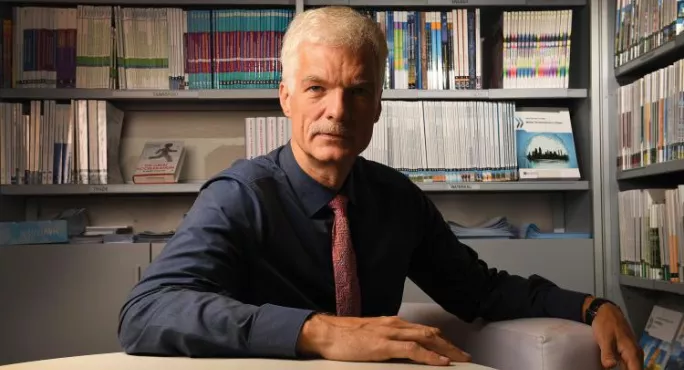- Home
- Pisa chief: ‘Mistrust of teachers holds England back’
Pisa chief: ‘Mistrust of teachers holds England back’

Andreas Schleicher, the man behind the Pisa global education study, has said England’s scores are being held back by a lack of trust in teachers.
He used a Tes interview to point out that some of the most successful education systems in the Programme for International Student Assessment (Pisa) had light-touch school inspection regimes.
Discussing attrition in UK teaching, Mr Schleicher said teachers’ heavy workload in England’s schools was down to mistrust of the profession.
News: WATCH: ‘Be proud,’ Pisa chief tells England’s teachers
Education policy: Seldon: Education ministers are ‘fundamentally stupid’
Estonia: Pisa’s European success story
“One of the things I’ve watched over time is there was a workload issue already 10 years ago, and then you had a dramatic rise in teaching assistants, which was meant to reduce the workload of teachers,” he said.
“Actually, it has changed nothing. Suddenly, England is one of the systems that has plenty of people in the system and still the problem of workload.
“It comes from a system where the lack of trust creates bureaucracy, creates mechanisms and the need to control. For public accountability, you have to give records for everything. There’s a price for this and that price is teacher workload.
Pisa boss highlights teacher workload
“It is preventing collaboration - and where there is professional collaboration it is focusing on the surface - sharing of resources or materials. It’s not focusing on collaborative professional development, or team teaching or cross-disciplinary learning - that’s where collaboration really happens.”
His comments came in the week that results from the latest Pisa study were published. England saw a rise in its math score, a small but statistically insignificant increase at reading and a drop in science.
Mr Schleicher said that Ofsted was a “response” to the lack of trust in teachers in England, rather than the cause, but he cited the low level of school inspections in high-ranking Estonia as a reason behind the country’s success.
“Estonia stands out in that it has very strong performance and very consistent performance. You don’t see much variation among schools, but that’s not because there is a government centrally monitoring what everybody’s doing - actually, Estonia has a very light culture of inspection.
“It’s really about tipping the system on the edges, not the heavy bureaucratic, intrusive kind of inspection regime, and I think we can learn from that.”
However, he added that high-performing regions in Pisa - such as Estonia and the provinces in China - were characterised by a belief in every pupil’s potential to succeed, no matter their background, which both England and Germany could learn from.
“There is a deep belief that every student can learn. It’s very important - they don’t have this inherent tolerance of failure that we have. We often blame things on the individual or their background.”
He said he visited a school in the Russian minority area of Estonia, in a working-class town, where pupils from chaotic homes were given space to sleep at school and were taken care of.
“I think this is what schools should be,” he said. ”‘Here are the challenges - we are going to solve them.’ They are not asking any government or social service, they are the centre of society.”
However, he said the academies system in England had given schools a degree of autonomy, as they had “more genuine room for manoeuvre” and could follow through on their ideas.
And he praised the pupil premium as having placed schools in the “driver’s seat” when it came to social inequality.
Mr Schleicher added that more needed to be done to attract teachers to work in challenging schools. He said that the best teachers should be given excellent resources and allowed to collaborate as much as possible, so that working in tough schools could be seen as a rigorous professional challenge.
“You have to make it intellectually challenging,” he said. “If you’re a great teacher and I want you to work in a difficult school, and I give you £100 more, it’s almost an insult.
“The question is more that you get the best access to the right mentors and have a great team around you. How can we create the right conditions?
“It is like a surgeon: you want to work with the most difficult operations, not just take out an appendix every day. You are really intrigued by the difficulty, because you know you are going to work in the best hospitals and they are going to give you the best technology and everything, and have a great team. Rhat’s how we have to think about it.”
Keep reading for just £1 per month
You've reached your limit of free articles this month. Subscribe for £1 per month for three months and get:
- Unlimited access to all Tes magazine content
- Exclusive subscriber-only stories
- Award-winning email newsletters



